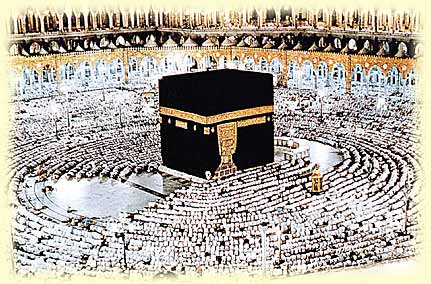Chapter 03 General Information on Islam
The Five Pillars of Islam are the framework of the Muslim life. They are the testimony of faith, prayer, giving zakat (support of the needy), fasting during the month of Ramadan, and the pilgrimage to Makkah once in a lifetime for those who are able.
1) The Testimony of Faith:
The testimony of faith is saying with conviction, “La ilaha illa Allah, Muhammadur rasoolu Allah.” This saying means “There is no true god (deity) but God (Allah),1 and Muhammad is the Messenger (Prophet) of God.” The first part, “There is no true god but God,” means that none has the right to be worshipped but God alone, and that God has neither partner nor son. This testimony of faith is called the Shahada, a simple formula which should be said with conviction in order to convert to Islam (as explained previously on this page). The testimony of faith is the most important pillar of Islam.2) Prayer:
Muslims perform five prayers a day. Each prayer does not take more than a few minutes to perform. Prayer in Islam is a direct link between the worshipper and God. There are no intermediaries between God and the worshipper.In prayer, a person feels inner happiness, peace, and comfort, and that God is pleased with him or her. The Prophet Muhammad said:
Bilal, call (the people) to prayer, let us be comforted by it.2
Bilal was one of Muhammad’s companions who was charged to call the people to prayers.
Prayers are performed at dawn, noon, mid-afternoon, sunset, and night. A Muslim may pray almost anywhere, such as in fields, offices, factories, or universities.
3) Giving Zakat (Support of the Needy):
All things belong to God, and wealth is therefore held by human beings in trust. The original meaning of the word zakat is both ‘purification’ and ‘growth.’ Giving zakat means ‘giving a specified percentage on certain properties to certain classes of needy people.’The percentage which is due on gold, silver, and cash funds that have reached the amount of about 85 grams of gold and held in possession for one lunar year is two and a half percent. Our possessions are purified by setting aside a small portion for those in need, and, like the pruning of plants, this cutting back balances and encourages new growth.
A person may also give as much as he or she pleases as voluntary alms or charity.
4) Fasting the Month of Ramadan:
Every year in the month of Ramadan,4 all Muslims fast from dawn until sundown, abstaining from food, drink, and sexual relations5) The Pilgrimage to Makkah:
La peregrinación anual (Hayy) a la Meca es una obligación a cumplir una vez en la vida, para aquellos que tengan los medios físicos y financieros de realizarla. Cerca de dos millones de personas van a Meca todos los años de todos los rincones del planeta. A pesar de que Meca esta siempre llena de visitantes, el Hayy anual comienza en el duodécimo mes del calendario islámico. Los peregrinos varones visten vestimentas especiales y simples (dos piezas de tela) que hacen desaparecer cualquier tipo de distinción cultural o de clases. A manera de que todos se presenten ante Dios sin diferencias.Pilgrims praying at the Haram mosque in Makkah. In this mosque is the Kaaba (the black building in the picture) which Muslims turn toward when praying. The Kaaba is the place of worship which God commanded the Prophets Abraham and his son, Ishmael, to build.}

The rites of the Hajj include circling the Kaaba seven times and going seven times between the hillocks of Safa and Marwa, as Hagar did during her search for water. Then the pilgrims stand together in Arafa5 and ask God for what they wish and for His forgiveness, in what is often thought of as a preview of the Day of Judgment.
The end of the Hajj is marked by a festival, Eid Al-Adha, which is celebrated with prayers. This, and Eid al-Fitr, a feast-day commemorating the end of Ramadan, are the two annual festivals of the Muslim calendar.